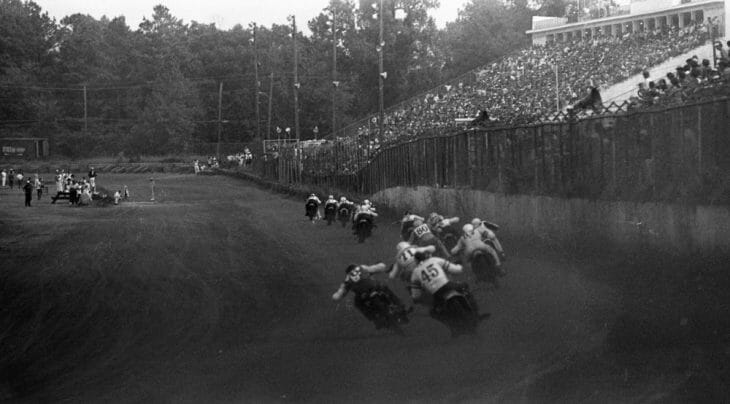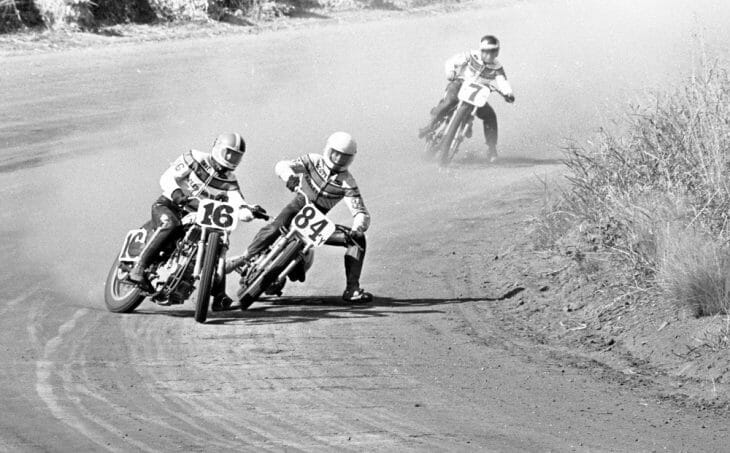Larry Lawrence | January 17, 2018
 The scene during the ill-fated Atlanta Mile in 1973 at Lakewood Speedway, which devolved into a minor riot after the fans waited all day through numerous delays only to watch the national be called after only five laps. (Gary Van Voorhis photo)
The scene during the ill-fated Atlanta Mile in 1973 at Lakewood Speedway, which devolved into a minor riot after the fans waited all day through numerous delays only to watch the national be called after only five laps. (Gary Van Voorhis photo)
The mood in the country was dark to begin with in September of 1973. Watergate, Vietnam, inflation and plant closings. Even the top movie of the year was a horror film – The Exorcist.
What does that have to do with motorcycle racing you ask? On September 10, 1973, a crowd of about 10,000 fans showed up to Atlanta’s Lakewood Speedway to watch an AMA Grand National race to maybe forget about what they were seeing on the nightly news for a few hours.
It was a hot day with temperatures right at 90 degrees when the fans gathered at the Lakewood Fairgrounds for the national. Lakewood hosted motorcycle races on and off since it first opened 1917. In fact, it was a motorcycle race that was the featured event when the track opened.
When built, Lakewood was considered the best racetrack in the South. In fact, it was often referred to as the Indianapolis of the South. It was a picturesque facility with a lake in the middle. A large grandstand, interestingly facing towards the front straight at a slight angle near the outside of turn one. The mile-long dirt track was part of a larger fairgrounds complex.
By the early 1970s however, the nearly 60-year-old facility was showing its age. Photos of the ’73 AMA race show an unkempt track, with grass and weeds growing waist high along the edges, haybales looking like they’d been in use for years, with many of them exploded and sitting in a loose heap. Where there wasn’t weeds, kudzu had devoured every other piece of landscape.
Lakewood’s racing surface, which had always been problematic for motorcycle racing, proved especially difficult for the 1973 national. The week leading up to the event had been hot and windy, taking the moisture out of the dirt and making it a baked hard adobe. By race day the track was a dusty, rutted mess.
A total of 48 riders posted for the race. Mert Lawwill set the pace in time trials on his factory-backed Harley-Davidson with a time of 41.67, followed by Rex Beauchamp and Kenny Roberts.
Rookie expert Scott Brelsford took the win in the first of four heat races. Beauchamp, Roberts and Gary Scott won the other heats. Frank Gillespie and Jimmy Maness scored victories in the semis. The original schedule called for the main event to get underway around 4:30 pm, but with all the delays, the riders didn’t get called for the 25-lap national until almost 7:00. The trouble now was the sun was beginning to get over the horizon and that combined with the dust proved a potentially lethal combination.
As AMA starter Duke Pennell waved the green flag, the 20-rider field charged into the first turn with Scott Brelsford leading. A thick wall of dust got kicked up with the setting sun hitting the dust. Riders farther back in the pack reported they were completely blinded.
One lap was all Jim Rice needed to realize it wasn’t worth it. He was followed off the track the next lap by Lawwill, Dick Mann and Dave Sehl. Seeing Mann pull off was probably the trigger that caused the officials to throw the red flag two laps later. When a rider of Mann’s reputation says it’s time to pull the plug, you know it has to be bad and you’ve got to hand it to the AMA’s referee Charlie Watson and manager of racing Bill Boyce for recognizing the problem and stopping the race.
A meeting with the riders was held. Opinion was split. Most younger riders wanted to race, while established veterans generally fell on the side of canceling. When it was decided not to restart, the tempers flared of a few riders, but was quelled when it was announced the purse would be paid.
Unfortunately for poor Scott Brelsford, his one and only win national victory came at what seemed at first, was a non-race. He appealed the decision of the AMA to award no points for the event and won and points were paid.
Fans were not pleased.
It was made even worse since they were not told what was going on, only to realize what was happening when teams started rolling their bikes back into the pits.
“I remember the fans being irate,” said David Aldana, who was squarely in the middle of the dusty pack of riders. “They threw ice chests, beer cans, trash, over a high chain link fence. I thought that the announcer could have quelled the situation, but dead silence. He never said a thing. No explanation, reason, nothing”
 Rookie expert Scott Brelsford (84Y), here battling with Dave Sehl (16), was credited the national win on the dusty Lakewood Mile. Initially riders were awarded no points for the race that was red flagged early because of dust, but Brelsford appealed and won and points were later awarded to all the riders. (Gary Van Voorhis photo)
Rookie expert Scott Brelsford (84Y), here battling with Dave Sehl (16), was credited the national win on the dusty Lakewood Mile. Initially riders were awarded no points for the race that was red flagged early because of dust, but Brelsford appealed and won and points were later awarded to all the riders. (Gary Van Voorhis photo)
John Blackstock would also become a racer, but in ’73 he was a 12-year-old spectator and says, “I can’t remember who came in first, but one by one, several of the top riders rolled to a stop at the flag stand. A few laps later it was red flagged. As I remember, a few cups and bottles were tossed over the fence onto the front stretch. The riders and tuners began grabbing bikes and heading to the pits. Then everything in sight was thrown over the fence including whole coolers with all contents. In those days the popcorn machine was a big glass box on the concession stand counter. Pretty sure it was shattered as well.”
The press box was bombarded with bottles and reporters and VIP guests were forced to take cover. Someone was quick thinking and turned off the lights so people would think the press box was empty. Eventually police had to clear the grandstands.
Promoter Don Brymer called the day the “low point of my life.”
Cycle News West editorialized about the race calling it the Atlanta National Bummer. The piece at the same time sided with the fans and racers, saying fans waited patiently all afternoon in the hot sun through numerous delays, as seemingly endless efforts to make the track rideable continued. Of the race the editorial said:
“They (fans) went home angry and seven bucks poorer. The more outraged and or juiced, had to be urged by police to depart. But had such a fiasco occurred at any of a dozen northern tracks, the place would have to be rebuilt. Now only Don Brymer’s reputation stands in need of reconstruction. That, and the image of championship motorcycle racing in the Atlanta area. But regardless of the outcome, notice has finally been served: Professional racers will not, and must not, compete under unsafe conditions.”
Going unannounced was the fact that Kenny Robert clinched the No. 1 plate that day. With the cancelation of the race there was no longer enough points available for Gary Scott to catch him. No fanfare. Instead of champagne podium ceremony with Roberts thrusting his index finger into the air in celebration, there was only Roberts walking quietly through the littered infield carrying on quiet conversations with other riders.